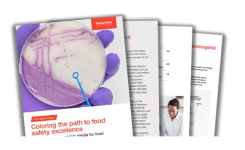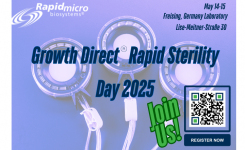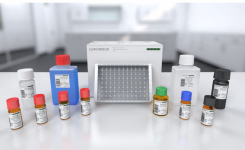Lab M MacConkey Agar No.2 Clearly Distinguishes Enterococci
go back to news archives| Colonies of Enterococcus faecalis on Lab M´s MacConkey II Agar | Able to tolerate a wide range of environmental conditions, Enterococci are often used as indicators of faecal pollution, and the newest addition to Lab M's family of MacConkey media is designed to support their culture and isolation. MacConkey Agar No.2 is a modified MacConkey Agar which contains bile salts No. 2 for the recognition of Enterococci. It is especially useful when these organisms are present alongside coliforms and non-lactose fermenters in water, sewage and food products. Appearing as small, intensely coloured, red-purple colonies on MacConkey Agar No.2, Enterococci are clearly distinguishable. |
| Non-lactose fermenters produce colourless colonies, while bile-tolerant Gram-positive organisms, such as Staphylococci and non-faecal Streptococci, are completely inhibited. Request your free sample now via email on info@labm.com or visit www.labm.com Enterococcus species are responsible themselves for a variety of clinical infections including urinary tract infections, bacteremia, bacterial endocarditis, diverticulitis, and meningitis. The new MacConkey Agar No. 2 is one of the most recent additions to Lab M's comprehensive portfolio of dehydrated culture media. It makes the detection and identification of Enterococci straightforward, enabling effective monitoring in both water treatment and food industry environments. |
NOTE: This item is from our 'historic' database and
may contain information which is not up to date.
Source : Lab M View Company Information
Posted on October 7, 2010
LATEST MICROBIOLOGY NEWS
-
AOAC Validated iQ-Check Vibrio PCR Kit
01 Apr 2025 -
AI-Powered Precision For Colony Counting
27 Mar 2025
MICROBIOLOGY EVENTS
-
Mycotoxin Detection and Analysis: Strategies to Support Your Testing Program
3 Apr 2025 -
15th Conference of The World Mycotoxin Forum® – WMFmeetsSalzburg
7 Apr 2025 -
ESCMID European Congress of Clinical Microbiology and Infectious Diseases
11 Apr 2025 -
IBQC 2025
14 Apr 2025 -
IFU Technical Workshop 2025
15 Apr 2025 -
Validation of Water Systems for Microbial Control
23 Apr 2025 -
USP Chapter <86> and the Move to Recombinant Methods
29 Apr 2025 -
Free Expert Webinar: Advancing Drinking Water Microbiology Testing Compliance & Efficiency
29 Apr 2025 -
British Society For Microbial Technology 40th Anniversary Microbiology Conference
15 May 2025 -
Sampling and Microbial Testing of Water and Data Trending
20 May 2025
















